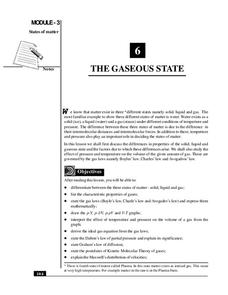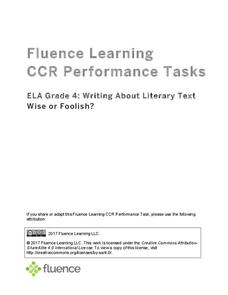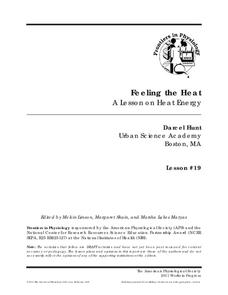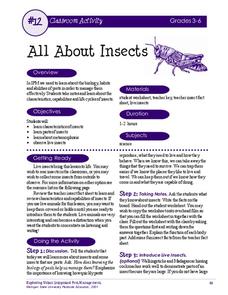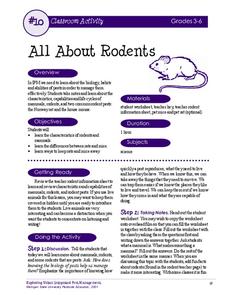Curated OER
Raven Chapter 14 Guided Notes: DNA, the Genetic Material
Because it is heavily focused on the contributors to DNA theory, this instructional activity may be more of an enrichment than a fundamental support to your genetics curriculum. Though it does query learners about DNA structure,...
American Physiological Society
Hoo Eats Who and What is What in Your Own Backyard?
Bird is the word! Teach life science scholars the importance of our feathered friends and the roles they play in our ecosystem. Using the plan, learners investigate the birds in their areas, determine the biotic and abiotic factors that...
Curated OER
Plate Tectonics
Help young scientists piece together the theory of plate tectonics with this comprehensive collection of materials. Whether your are looking for worksheets, hands-on activities, or assessments, this resource has everything a science...
International Technology Education Association
Become a Weather Wizard
Accurate weather forecasting is something we take for granted today, making it easy to forget how complex it can be to predict the weather. Learn more about the terms and symbols used to forecast the weather with an earth science lesson...
Curated OER
Exam Review: Chemistry Calculations
In this chemistry calculations review learning exercise, students solve 33 review problems about titrations, precipitates, pressure and volume of gases, combustion reactions, heat of combustion, molar concentrations and molecular formulas.
National Institute of Open Schooling
The Gaseous State
Sixth in a series of 36, this lesson focuses on gases and their behavior in given situations. Learners review the states of matter and then focus on gases, specifically learning Boyle's, Charles's, Avogadro's Laws, Dalton's, and Graham's...
American Physiological Society
How Does the Density of a Liquid Affect the Buoyancy of an Object?
Here's a lesson plan that will really float your boat! Introduce physical science scholars to the relationship between buoyancy and density through an assortment of individual and collaborative exercises. Lab groups work together to...
Fluence Learning
Writing About Literary Text: Wise or Foolish?
A three-part assessment promotes reading comprehension skills. Class members read literary texts and take notes to discuss their findings, answer comprehension questions, write summaries, and complete charts.
American Physiological Society
Sticky Adaptations A Lesson on Natural Selection
Now you see it, now you don't! The stick bug exhibits the ability to disappear into a wooded environment. Why does this adaptation manifest in some species, but not in others? Life science students explore animal adaptations in nature...
Minnesota Literacy Council
Scientific Method
Here is a resource with a descriptive approach to explaining the scientific method. It's simple, but effective for both introduction and reinforcement of this concept.
American Physiological Society
Feeling the Heat
How do the changing seasons affect the homes where we live? This question is at the forefront of engineering and design projects. Challenge your physical science class to step into the role of an architect to build a model home capable...
University of Washington
Kepler’s Laws
Introduce your physics or astronomy class to Kepler's laws of planetary motion with this straightforward worksheet. It covers the basic concepts of each and has learners answer questions to demonstrate their grasp on them. You could use...
American Physiological Society
Thermal Insulators: Keep it Hot!
There's nothing like a cup of hot chocolate on a chilly winter's day. Except for when that hot chocolate quickly becomes lukewarm chocolate ... or even cold chocolate. What material provides the best insulation to keep the chocolate from...
Michigan State University
All About Insects
Insects are the focus of an activity that looks deep into the anatomy and metamorphosis of everyday bugs. Two worksheets reinforce knowledge obtained through a teacher-guided grand conversation and insect observation.
Curated OER
Review For Weather Quiz
In this science worksheet, young scholars review the concepts that were previously covered related to weather fronts and other types of systems.
Curated OER
Clouds and Precipitation Review
In this science worksheet, young scholars review the concepts that tie the relationship of clouds and how they collect precipitation in response to changes in humidity.
American Physiological Society
Effects of Environment on Enzymes
Much like the tale of Humpty Dumpty, proteins, once altered, will never be the same again. Honors and pre-AP biology classes explore the delicate world of enzymes via a Webquest and lab experiment. The teacher's guide contains all...
American Physiological Society
An Inquiry into Alcoholic Fermentation
Introduce life science students to their new "best buds" yeast! Using a wide variety of materials, lab groups design an experiment that illustrates how yeast acquires the resources it needs to undergo cellular respiration. The teacher's...
American Physiological Society
What Environmental Conditions Lead to the Hatching of Brine Shrimp?
Will changing the environment in which brine shrimp live impact their reproductive success? Young scientists get hands-on experience studying the habitat of brine shrimp in a two-week immersion instructional activity. The teacher's guide...
American Physiological Society
Did I Observe it or Infer it?
Take the mystery out of inquiry! When young scientists learn to use their keen powers of observation to make smart inferences about a situation, they are well on their way to understanding what the scientific method is all about. Using...
Michigan State University
All About Rodents
Get to the know the common house mouse and the Norway rat with an activity that reinforces reading comprehension skills. Scholars read a three-page document detailing key information about mammals, specifically rodents, and use their...
American Physiological Society
Why is Kettle Corn Cooked in Copper Pots?
The kitchen — it's not just for eating anymore! Specific heat is often a difficult concept to grasp, so give it context by relating it to cooking. Learners gain experience in the principles of thermal energy transfer by designing an...
American Physiological Society
Sit On It
How do product designers come up with the variety of things we see in stores and on TV every day? They identify a need, then create something that meets that need. Sounds simple, right? A two-week lesson puts seventh graders in that role...
American Physiological Society
Drug the Water Flea
This is a flea. This is a flea on drugs. Any questions? Your class will have questions aplenty during an impactful experiment. Lab groups get to know Daphnia magna, the humble water flea, and study the effects of stimulants and...







